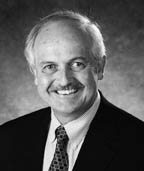|
Gordon D. Ginder, M.D.
Virginia Commonwealth University, Massey Cancer Center
 Dr. Gordon Ginder, son of Clyde Ginder of Arenzville, is director of the Massey Cancer Center. Dr. Ginder's research has led to a better understanding of the basic mechanisms involved in the regulation of genes that play a major role in human health and disease. Discoveries from Dr. Ginder’s investigations have contributed to a new area of genetic research called epigenetics. A major discovery attributed to Dr. Ginder is that a modification of DNA called methylation is associated with inactivation of gene expression. While the initial research and basic mechanisms of DNA methylation-induced silencing of genes has been in tissue culture and model systems, there is growing evidence that DNA methylation may be a more common mechanism than gene mutation in causing cancer. DNA methylation is now a recognized target for developing treatment of resistant cancers and may some day be a target for molecular prevention of cancer. Dr. Gordon Ginder, son of Clyde Ginder of Arenzville, is director of the Massey Cancer Center. Dr. Ginder's research has led to a better understanding of the basic mechanisms involved in the regulation of genes that play a major role in human health and disease. Discoveries from Dr. Ginder’s investigations have contributed to a new area of genetic research called epigenetics. A major discovery attributed to Dr. Ginder is that a modification of DNA called methylation is associated with inactivation of gene expression. While the initial research and basic mechanisms of DNA methylation-induced silencing of genes has been in tissue culture and model systems, there is growing evidence that DNA methylation may be a more common mechanism than gene mutation in causing cancer. DNA methylation is now a recognized target for developing treatment of resistant cancers and may some day be a target for molecular prevention of cancer.
Another major discovery made in Dr. Ginder’s laboratory is that butyric acid, a naturally occurring fatty acid, could activate silenced genes in normal blood cells. Clinical trials demonstrated that butyrate may be effective in treating common genetic blood disorders, including sickle cell anemia and beta-thalassemia.
Recently, Dr. Ginder’s research group made discoveries about the regulation of a set of genes called human major histocompatibility (MHC) antigen genes, which control the body’s immune system response to cancer. The proteins made by these genes also determine if human organ and bone marrow transplants are accepted or rejected by the recipient. Findings in Dr. Ginder’s laboratory show that different mechanisms regulate different members of the MHC antigen gene family. Recognizing gene-specific mechanisms sets the stage for more successful anticancer immunotherapy and bone marrow transplantation.
Dr. Ginder earned his bachelor’s of science (with highest honors) at the University of Illinois. He received his M.D. from Johns Hopkins University School of Medicine, completed his internship and residency at Case Western Reserve University, served as a research associate at the National Institutes of Health and a hematology/oncology fellowship at the University of Iowa.
For more than 22 years Dr. Ginder’s research had been continuously supported by competitive, peer-reviewed grants from the NIH. In 1992 he received an NIH MERIT award in recognition of sustained important contributions to his field.
Source: Science Museum of Virginia, 2003.
return to the top of this page
|
 ARENZVILLE, IL | HOME OF THE WORLD'S BEST BURGOO
ARENZVILLE, IL | HOME OF THE WORLD'S BEST BURGOO  Dr. Gordon Ginder, son of Clyde Ginder of Arenzville, is director of the Massey Cancer Center. Dr. Ginder's research has led to a better understanding of the basic mechanisms involved in the regulation of genes that play a major role in human health and disease. Discoveries from Dr. Ginder’s investigations have contributed to a new area of genetic research called epigenetics. A major discovery attributed to Dr. Ginder is that a modification of DNA called methylation is associated with inactivation of gene expression. While the initial research and basic mechanisms of DNA methylation-induced silencing of genes has been in tissue culture and model systems, there is growing evidence that DNA methylation may be a more common mechanism than gene mutation in causing cancer. DNA methylation is now a recognized target for developing treatment of resistant cancers and may some day be a target for molecular prevention of cancer.
Dr. Gordon Ginder, son of Clyde Ginder of Arenzville, is director of the Massey Cancer Center. Dr. Ginder's research has led to a better understanding of the basic mechanisms involved in the regulation of genes that play a major role in human health and disease. Discoveries from Dr. Ginder’s investigations have contributed to a new area of genetic research called epigenetics. A major discovery attributed to Dr. Ginder is that a modification of DNA called methylation is associated with inactivation of gene expression. While the initial research and basic mechanisms of DNA methylation-induced silencing of genes has been in tissue culture and model systems, there is growing evidence that DNA methylation may be a more common mechanism than gene mutation in causing cancer. DNA methylation is now a recognized target for developing treatment of resistant cancers and may some day be a target for molecular prevention of cancer.